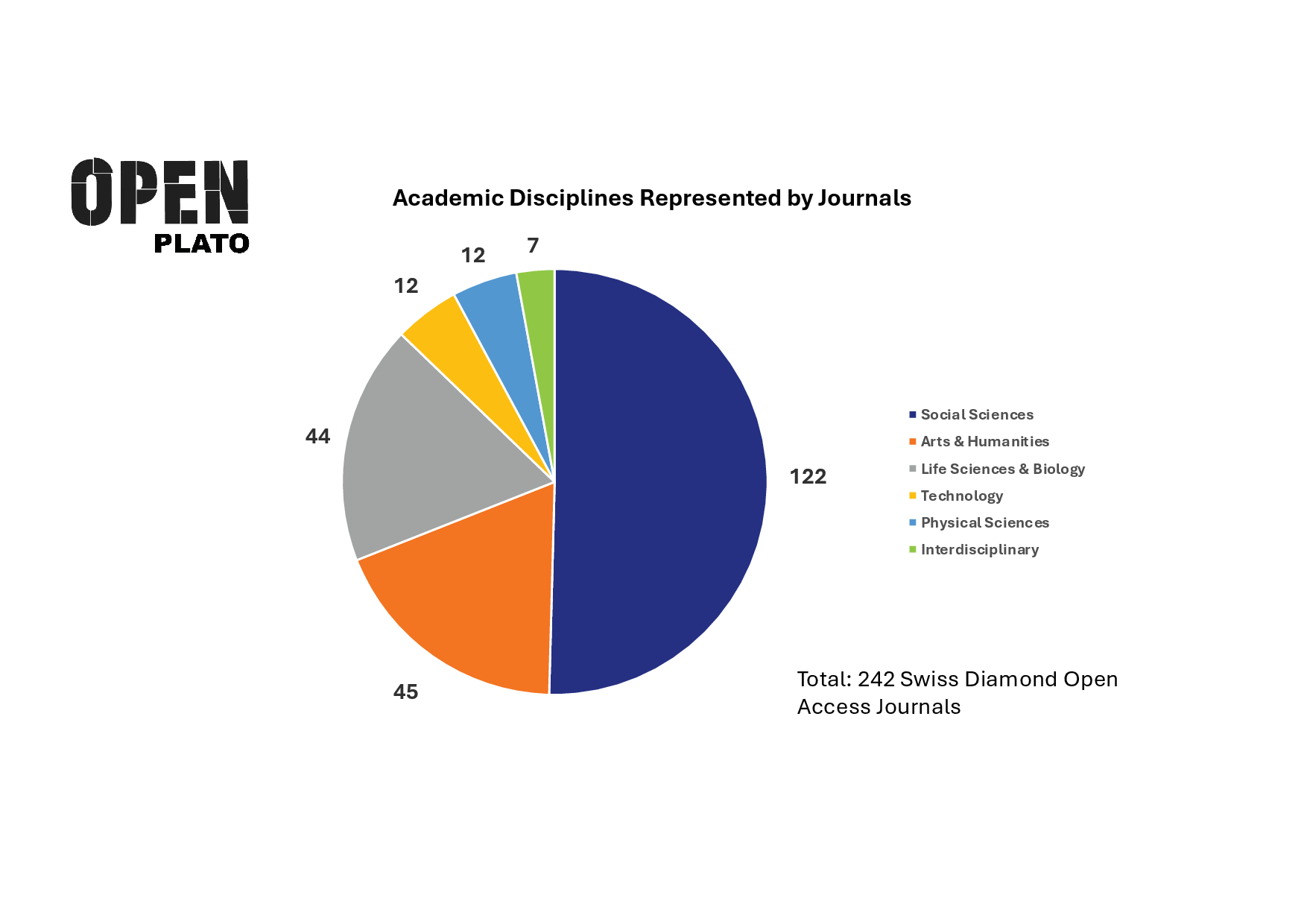Platinum Open Access Funding (PLATO)
About this Project
PLATO is a national initiative of six Swiss universities that aims to further Diamond Open Access in Switzerland and develop strategies of funding and support for Diamond Open Access publishing. Diamond Open Access (also known as Platinum Open Access) refers to publishing and accessing scholarly publications without price barriers for authors and readers. PLATO is co-funded by swissuniversities and the partner universities.
Scientific Summary
In Switzerland, there are currently around 240 Diamond Open Access journals characterised by a diversity of disciplines and languages. These journals are primarily published by researchers or small research teams at universities and by scholarly societies. One editor describes the journal as a “service for the scientific community”: “When the community thrives, so does the journal.”
The Strength of Diamond Open Access
The appeal of Diamond Open Access journals lies in their disciplinary specificity, their integration into local research contexts, and international outreach. A key strength of Diamond Open Access is promoting scholarly publishing free from commercial interests and thus academic freedom. By providing equal access for researchers from all backgrounds to publish their work and access others’ research without constraints, it also improves collaboration and transparency in research.
Why PLATO?
The PLATO study was an initial effort to highlight the Diamond Open Access landscape in Switzerland and its specific challenges. The lack of sustainable funding options, recognition from institutions, support for ongoing operations and best practices in areas like database indexing, long-term archiving, or metadata provision were recurring issues in the survey and interviews with editors. While many editors have a cautiously optimistic outlook for the next year, their confidence wanes when considering the journal’s stability over the next three years.
Aims of PLATO
Based on the study’s results, the PLATO project, in collaboration with universities, libraries, scientific academies, and funding institutions, aims to provide guidance on sustainable funding and support for Diamond Open Access journals. European initiatives like the DIAMAS projects provide a larger framework for developing these strategies. The goal of these initiatives and the PLATO project is to return the control of scientific communication to researchers and make high-quality open-access publishing accessible to all.
Challenges and Goals
PLATO aims at developing funding and support strategies for Diamond Open Access publishing in Switzerland. In order to reach this goal, the PLATO project – in collaboration with the Institute of Applied Data Science & Finance at the Bern University of Applied Sciences – first conducted and published a landscape study on Swiss Diamond Open Access journals. Through presentations, webinars and informal conversations, the project also succeeded in opening communication channels with all project stakeholders as well as other Diamond Open Access initiatives in Switzerland and beyond.
The challenges the project faces are threefold:
- Furthering Diamond Open Access in Switzerland hinges, firstly, on the engagement and support from the research communities for scholar-led open access publishing. This is a complex issue as it is part of the overall cultural change to open science which depends on disciplinary traditions, processes of research assessment as well as reputation and reward systems that incentivise researchers to prioritise certain publishing practices over others.
- The second challenge relates to the implementation of support and funding strategies. Limited budgets and the hesitation towards change in organisations are structural hindrances in putting possible funding and support schemes into practice.
- It is crucial that the momentum created by international initiatives and the PLATO project will be maintained and sustained beyond the end of the project duration (till December 2024).
Results and Output
- 2022: Landscape Study «Mapping the Swiss Landscape of Diamond Open Access Journals. The PLATO Study on Scholar-Led Publishing» (https://zenodo.org/records/7461728)
- Since 2022: Publication of List of Swiss Diamond Open Access Journals (https://zenodo.org/records/6992615)
- March 2024: Organisation of 1st Swiss Diamond Open Access Conference (Conference Report: https://zenodo.org/records/10955049)
Impact on Open Science Practices
Diamond Open Access provides researchers with the great benefit of not having to pay fees for immediate open access publications that are also free to read. Moreover, authors retain the copyrights of their works which gives them full control over their publications. At the same time, by publishing Diamond Open Access, researchers also strengthen the diversity of publication outlets in their field because these outlets are embedded in local research communities while being accessible from all around the globe. By providing an alternative open access publishing infrastructure, Diamond Open Access will thus contribute to creating a more equal, sustainable, affordable and diverse scientific communication ecosystem.
